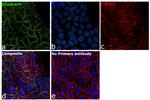Search Thermo Fisher Scientific
FIGURE: 1 / 2
P-cadherin Antibody (14-9873-82) in ICC/IF


Product Details
14-9873-82
Species Reactivity
Host/Isotype
Class
Type
Clone
Conjugate
Form
Concentration
Purification
Storage buffer
Contains
Storage conditions
Shipping conditions
RRID
Product Specific Information
Description: The monoclonal antibody 12H6 recognizes human P-cadherin (placental-cadherin), a calcium dependent cell-cell adhesion protein. This 118 kDa transmembrane protein was originally named due to its expression in mouse placental tissue. Unfortunately, it is not expressed in human placental tissue. The function of the molecule will depend on the associations with the specific member of the cytoplasmic catenin family (alpha, beta and gamma). The specific interaction defines the strength and signaling of the cell-cell interaction. Expression is less broad than E-cadherin; P-cadherin is restricted to the basal proliferative cell layer of stratified epithelia. During development expression is found in the proliferating tissues such as hair follicle keratinocytes and the growth regions in ductal mammary tissue. There is evidence that P-cadherin can be secreted from epithelial cells during the late stages of pregnancy. P-cadherin expression is associated with poor prognosis for breast cancer while reduced expression in melanomas and squamous cell carcinomas may also result in poor prognosis.
Applications Reported: This 12H6 antibody has been reported for use in western blotting, immunohistochemical staining of formalin-fixed paraffin embedded tissue sections (IHC-P), and immunocytochemical staining (ICC).
Applications Tested: This 12H6 antibody has been tested immunohistochemistry on formalin-fixed paraffin embedded (FFPE) human skin with low pH antigen retrieval. This antibody can be used at less than or equal to 10 µg/mL. It is recommended that this antibody be carefully titrated for optimal performance in the assay of interest.
Purity: Greater than 90%, as determined by SDS-PAGE.
Aggregation: Less than 10%, as determined by HPLC.
Filtration: 0.2 µm post-manufacturing filtered.
Target Information
P-cadherin, also known as Cadherin-3, is a Type 1 cadherin protein that belongs to the cadherin superfamily. Type 1 cadherins are single-pass transmembrane proteins that have 5 extracellular cadherin repeats and an intracellular domain that binds p120-catenin and beta-catenin. Cadherins are calcium-dependent cell-cell adhesion glycoproteins responsible for a range of processes including development, wound healing, cell-cell signaling, cell growth and differentiation. P-cadherin is expressed in human fetal structures, and in adult tissues such as the basal layer of the epidermis, breast, prostate, ovary, cervix, hair follicle, and corneal endothelium. P-cadherin expression has also been reported on embryonic stem cells, and stem cells of the normal mammary gland, and hair follicle. Overexpression of P-cadherin has been associated with poor prognosis in breast, prostate, ovary, colon, and stomach carcinomas. Mutations in CDH3 are associated with congential hypotrichosis with juvenile macular dystrophy.
For Research Use Only. Not for use in diagnostic procedures. Not for resale without express authorization.
References (0)
Bioinformatics
Protein Aliases: CADH3; cadherin 3, type 1, P-cadherin (placental); Cadherin-3; calcium-dependent adhesion protein, placental; P-cadherin; Placental cadherin; Placental-cadherin
Gene Aliases: CDH3; CDHP; HJMD; PCAD
UniProt ID: (Human) P22223
Entrez Gene ID: (Human) 1001

Performance Guarantee
If an Invitrogen™ antibody doesn't perform as described on our website or datasheet,we'll replace the product at no cost to you, or provide you with a credit for a future purchase.*
Learn more
We're here to help
Get expert recommendations for common problems or connect directly with an on staff expert for technical assistance related to applications, equipment and general product use.
Contact tech support
